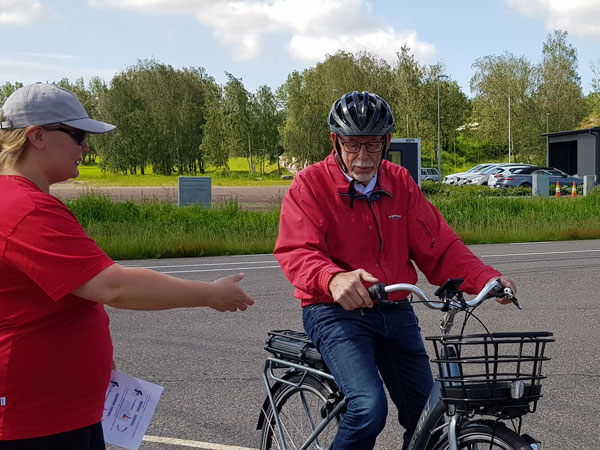Cycling is good both for your health and the environment. It can give you freedom and the ability to get out and about, not least for the elderly. But with age, it can become harder to choose your bike over your car. Maybe your fitness and balance are not what they used to be, or you may have experienced a fall.
Helena Selander, senior researcher at VTI, is leading a project to promote safe cycling among the elderly.
“We searched for participants through local senior organizations and received a very positive response.”

Officials from NTF Väst in Sweden gave instructions for the exercises. Photo: Anna Swedestam/NTF Väst
The 24 participants were between the ages of 67 and 81. The group consisted of both women and men, ranging from experienced cyclists to those who rarely use bikes at all. NTF’s traffic training site at Stora Holm in Gothenburg offered a safe environment where participants got to try out a regular one-speed women’s bike, an electric bike, and an electric tricycle in various exercises.
“Based on their own abilities and experience as cyclists, the exercises allowed them to test how to steer, brake, and cycling at various speeds. They also got to try it with a heavier load, simulating what it would be like bringing groceries back from the store.”
Many participants felt that bike helmets were important. Some had fallen in the past, and it had made them scared of cycling. During the day, they were offered information and given a chance to try out bike helmets in NTF Väst’s exhibition hall.
After the cycling activities, participants were asked to evaluate the bikes based on factors such as what it was like getting on and off the bike, keeping balance, and cycling with a heavier load in the bicycle basket.
“A group discussion was also held about cycling, where participants were asked to talk about their current cycling habits, or their reasons for not cycling if that was the case. What could make them start cycling, or get them to cycle more?”
Helena Selander explains that many participants were interested in the electric bike. They had not tried it before but had thought about whether it could be something of interest.
“They may get to the grocery store but then have a difficult hill to climb on the way back home, and with a heavy grocery bag in their basket. The electric bike can help them get all the way home.”
She does not think that it would be hard to recruit participants for similar activities.
“Many would no doubt appreciate a chance to try out an electric bike for the first time, under safe circumstances, and get impartial information before committing to buying one. When you are standing there in the bike shop, it is good to know a bit about the advantages and disadvantages of different batteries, or where the motor is located. The quality of the bike is obviously also important.”
Experiences from the project will be used to produce consumer information to help elderly people find a bike to suit their needs, along with tips to keep people cycling well into old age. The information will be available on NTF’s website and will also be disseminated to relevant organisations.
The project, which runs until the autumn, is funded by the Skyltfonden fund (Swedish Transport Administration) and is a collaboration between VTI, Cycleurope, Trivector and NTF.
 Contact:
Contact:
Helena Selander
helena.selander@vti.se
VTI, Sweden






Follow us: